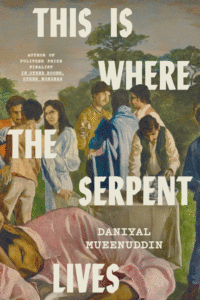
On George Eliot's Uncertain Relationship to Feminism
Kathy O'Shaughnessy on Her "Liberating Honesty"
Middlemarch is such a classic that characters like Dorothea, Casaubon, and Rosamund seem to have been not so much invented as discovered. They have an afterlife in our minds. Dorothea, especially.
But when I was writing my novel about George Eliot, researching her notebooks, letters, diaries from her Middlemarch period, I got a shock. I couldn’t find Dorothea. And then I realized—for the first 18 months of writing Middlemarch, there was no Dorothea. Eliot had one protagonist only during that time—Lydgate.
I became fascinated by this delay. How strange, that what read so naturally, with such aliveness and seeming rightness, had been arrived at with such difficulty, and after such a prolonged block. My book about Eliot is a story (her story) in its own right, but within that, another story was demanding my attention, too. What was this delay? I looked for clues as I read Eliot’s letters, combed through the chronology of her days, thought about who she’d seen and written to, what was going on at home and more generally in her life. Gradually I began to see a shadowy evolution—something in the nature of a feminist awakening.
*
George Eliot’s personal history, and her achievements, meant that she was a feminist icon for her peers. She’d defied the double standards of the day by living openly with George Lewes, who was married (though separated), but who couldn’t legally get a divorce. Marian Evans, or Marian Lewes, as she called herself, had become instantly notorious, until her books brought her forgiveness and acclaim.
Her thematic aim was large: to say that our written histories are not the only way to take account of the past, the big known deeds are only part of the story.
Lewes had three sons from his marriage. The spring that Eliot was brewing Middlemarch, in 1869, Lewes’s middle son Thornie was due to come home from the British colony of Natal (now called Kwa-Zulu Natal, part of South Africa), as he’d fallen ill. Thornie arrived six weeks earlier than expected—just when Eliot had hoped to get down to her book. Terrifyingly emaciated, Thornie had lost four and a half stone. Henry James records visiting them where they lived in Regent’s Park, finding the white-faced Thornie writhing on the drawing-room floor, with a distracted, frightened Eliot in charge, Lewes having dashed out (on a Sunday) to try to find morphine. Thornie had tuberculosis of the spine, undiagnosed.
Thornie’s presence thrust George Eliot back into her role of stepmother, a role that brought with it a variety of tensions—not least, the need to “do her duty.” The mother’s role is an important one in Eliot’s thinking, deeply informing her response to one of the great issues of the day—the position of women. But in spite of being a feminist icon herself, she disappointed her progressive peers (many of whom were her friends) when it came to her views. Eliot was conservative politically—she didn’t think women should have the vote, for instance.
I mean that as a fact of mere zoological evolution, woman seems to me to have the worse share in existence, But for that reason I would the more contend that in the moral evolution we have “an art which does mend nature”—an art which “itself is nature”. It is the function of love in the largest sense, to mitigate the harshness of all fatalities. And in the thorough recognition of that worse share, I think there is a basis for a sublimer resignation in woman and a more regenerating tenderness in man.
She saw women as having a special power to nurture—”that exquisite type of gentleness, tenderness, possible maternity suffusing a woman’s being with affectionateness, which makes what we mean by the feminine character”—and she saw feminism as threatening this character. “There is no subject on which I am more inclined to hold my peace and learn, than on the ‘Women Question.’ It seems to me to overhang abysses, of which even prostitution is not the worst.”
But now Eliot was being tested on precisely this nurturing territory. She was trying to write Middlemarch, and the periods of concentration and quiet, essential for work, were interrupted by Thornie’s illness, sometimes by his screams. The days were broken “into small fragments.” “We are not only kept at home but kept also from any consecutive occupation by a sad family trouble” she wrote (my italics). I was trying to feel and guess and interpret my way into her head. Having been close to her (as it were) through her letters, and witnessed how difficult it was for her to hold her confidence as she wrote, it was impossible to feel that her reactions to Thornie would have been unmixed. We can perhaps catch this ambivalence in the following letter to her younger friend Emilia Pattison. She begins by apologizing for her effusiveness (they were still getting to know each other, and Eliot worried she’d been over familiar):
But in proportion as I profoundly rejoice that I never brought a child into the world, I am conscious of having an unused stock of motherly tenderness, which sometimes overflows, but not without discrimination.
I hear the veiled note of exasperation in that “profoundly rejoice.” She’d been writing Middlemarch for six weeks, with her Lydgate-only cast, and was beginning to lose steam. (Incidentally here, maybe, we glimpse a seed of the future heroine. Emilia Pattison happened to be unhappily married to the scholar Mark Pattison, 27 years older, who happened to be writing a biography of the Renaissance scholar, Isaac Casaubon…)
Thornie’s troubles continued through the summer. Eliot’s grip on her book faltered. In October she put the manuscript aside and gave herself to her stepson. He died on October 9th. There is no mistaking her sincerity:
Dearest Barbara
Thanks for your tender words. It has cut deeper than I expected—that he is gone and I can never make him feel my love any more. Just now all else seems trivial compared with the powers of delighting and soothing a heart that is in need.
His death hit Eliot hard, in spite of any frustrations she might have experienced. A desolate autumn, spring and summer followed. Middlemarch was fairly paralyzed. But a process had been kickstarted.
In the early summer she heard news of a friend who had been bereaved, Lady Lytton. Eliot wrote to her:
My dear Mrs Lytton,
I know from what your dear husband has told us, that your loss is very keenly felt by you—that it has first made you acquainted with acute grief, and this makes me think of you very much. For learning to love any one is like an increase of property,—it increases care, and brings many new fears lest precious things should come to harm.
At present the thought of you is all the more with me, because your trouble has been brought by death; and for nearly a year death seems to me my most intimate daily companion.
I try to delight in the sunshine that will be when I shall never see it any more. And I think it is possible for this sort of impersonal life to attain great intensity,—possible for us to gain much more independence, than is usually believed, of the small bundle of facts that make our own personality.
We women are always in danger of living too exclusively in the affections; and though our affections are perhaps the best gifts we have, we ought also to have our share of the more independent life—some joy in things for their own sake. It is piteous to see the helplessness of some sweet women when their affections are disappointed—because all their teaching has been, that they can only delight in study of any kind for the sake of a personal love. They have never contemplated an independent delight in ideas as an experience which they could confess without being laughed at. Yet surely women need this sort of defence against passionate affliction even more than men.”
These are some of the most beautiful lines Eliot ever wrote. And it’s her first, passionate feminist plea. Thornie’s death has taught her something critical about the mother-role: that the dependence of others, in a family, can take you over, with an undreamt-of emotional intensity. The life of the mind is needed, both for its own sake, and as a “sort of defence against passionate affliction”.
Following Thornie, her impregnable mental fencing-off of a certain reality, about women’s lives, has splintered. She’s allowed herself to take this reality into her feeling, actively questioning the wisdom of women being defined by the function of nurture alone. And by acknowledging that reality out there she is able, at the end of the summer, to turn her gaze inward. She writes Armgart.
Armgart is the one fully dramatic poem Eliot wrote. It’s a drama with four voices, in which Eliot plays out, with great compression, arguments about female ambition.
Armgart, the eponymous heroine, is a prodigiously gifted singer—Eliot’s avatar. Eliot is revolving the dilemmas facing women at a deep urgent level now; and it’s as if she hasn’t time to play out these issues in the long characterologically complex way that the form of the novel demands: she wants the arguments out there, at their baldest. Thus, Armgart’s suitor, called Graf, offers Armgart marriage—provided she gives up her art. It’s a stark either-or set-up, the roles of wife and woman-artist mutually exclusive.
Her fear of failure is deep and frightening. But something else is getting outed too: her desire not to be ordinary, her desire to be great.
Graf argues that a woman’s rank “Lies in the fullness of her womanhood.” Through Armgart, Eliot rebuts this, more fiercely, more directly, than anywhere else in her work. “Yes I know That oft-taught gospel: Woman, thy desire shall be that all thy superlatives on earth Belong to men, save the one highest kind, To be a mother.” But, she argues, the same Nature that gave women the ability to bear children, gave her her artistic talent, her voice, and her ambition too. Having aired Eliot’s private manifesto, Armgart plays out her most pressing creative concerns. Graf argues that given that Armgart has shown what she can do as a great artist, she had best stop here, in case she fails.
Armgart rebuts this: “True greatness ever wills—It lives in wholeness if it lives at all, And all its strength is knit with constancy.”
(Writers, take note. Keep going, in other words.)
Graf goes on to say that “high success has terrors when achieved”—not least, the fear of failing; “You said you dared not think what life had been Without the stamp of eminence; have you thought How you will bear the poise of eminence With dread of sliding?”
Eliot’s getting very confessional here. Her fear of failure is deep and frightening. But something else is getting outed too: her desire not to be ordinary, her desire to be great. She answers Graf through Armgart: “I accept the peril. I choose to walk high with sublimer dread Rather than crawl in safety…”
I love what Armgart shows us about Eliot. She is daring to confront herself. She doesn’t just explore her fears, including that she’s finished as a writer (as she’s so paralyzed writing Middlemarch); she airs her intense pleasure, her triumph in being a great artist, and her view that an artist like herself—she clearly had the measure of herself—deserved fame, “That sense transcendent which can taste the joy Of swaying multitudes, of being adored For such achievement.”
Eliot’s candor is startling. She’s savoring the joy of being adored by swaying multitudes. It contrasts wonderfully with her super-modest persona in her letters, where the rule of thumb is to be desponding, anxious, despairing, when talking about her writing. Although there’s no doubt she did suffer from agonizing self-doubt, it’s also clear, she preferred presenting herself this way, in line with traditional modest femininity. It’s the flip side of the true elephant in the room—ambition.
“I feel that my besetting sin” she writes, age 19, “is the one of all others most destroying, as it is the fruitful parent of them all, Ambition, a desire insatiable for the esteem of my fellow-creatures.”
But here’s the thing. The book she was trying to write, Middlemarch, was about ambition, the desire to do something in life, and it cried out for female treatment, with women denied education and opportunity. Conceiving her theme through Lydgate, Dorothea, was not going to appear until the ghostly obstructive presence of Eliot’s egotism, ambitiousness, had been given shape, as it is in Armgart. “Shall I turn aside From splendours which flash out the glow I make, And live to make, in all the chosen breasts Of half a Continent? No, may it come, That splendour! May the day be near when men …And new lands welcome me upon their beach, Loving me for my fame. That is the truth Of what I wish, nay, yearn for. Shall I lie? Pretend to seek obscurity—to sing In hope of disregard? A vile pretence!”
The power of nurturing is a precious addition to humankind, and this is women’s primary special function—unless, that is, you are a genius like me.
Now, Eliot is not just talking about the thrill of making great art (“the glow I make”); she’s talking about that more worldly phenomenon—fame, the exalted sensation of being celebrated, even worshipped, and her love of it. She’s voiced that hot, dangerous area—the moment of triumph that can bleed into self-importance, self-love, pride, ultimately hubris.
Middlemarch‘s theme touched too directly on her own suppressed sense of self-exaltation, and the tense matter of being in a different sphere to other women. Eliot writes and talks many times about her dislike of people writing mediocre books, adding to that useless pile of “bad literature.” Regarding women and education, she says to Barbara Bodichon, “No good can come to women, more than to any class of male mortals, while each aims at doing the highest kind of work, which ought rather to be held in sanctity as what only the few can do well.” [My italics] Eliot, though, does do the “highest kind of work.” The true, problematic nature of her position regarding “the women question” could be summed up by this: the power of nurturing is a precious addition to humankind, and this is women’s primary special function—unless, that is, you are a genius like me.
And in Armgart, mining herself with liberating honesty, she brings that immodest self into the light.
It’s no accident that this block happened with Middlemarch. Not only was the theme right on the money (women and ambition), she was herself upping her game. She was about to write a book that was nothing if not ambitious. Her notebooks for that time, the Folger and Berg, are thrilling, dizzying in their range, their fragments of cultural reference, ancient, medieval, modern, in Greek, Latin, German, Italian, French. Her thematic aim was large: to say that our written histories are not the only way to take account of the past, the big known deeds are only part of the story.
Those unhistoric small invisible acts, that permeate our lives, matter too.
She wrote Armgart in September. In November, though, she began writing a story. It featured a young woman called Dorothea Brooke, and it flowed easily. She didn’t connect it with Middlemarch. But in the following spring the penny dropped; the themes matched, they belonged together. She joined the two parts, and Dorothea took center-stage. From that point, Middlemarch was written at a very good pace.
__________________________________

In Love with George Eliot by Kathy O’Shaughnessy is available now via Scribe Publications.
Kathy O'Shaughnessy
Kathy O’Shaughessy is the author of In Love with George Eliot: A Novel, available now from Scribe Publications.



















